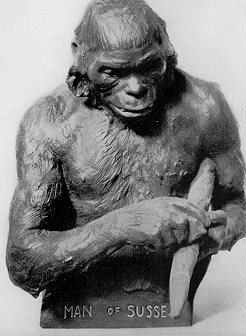 Book tells story of science philosopher
Book tells story of science philosopher2007/10
By F.N. D‘ALESSIO, Associated Press
"The Jesuit & The Skull" (Riverhead Books. 304 pages. $24.95 hardcover), by Amir D. Aczel: Father Pierre Teilhard de Chardin had already been dead for several years when his book, "The Phenomenon of Man," became a surprise international best seller in the late 1950s.
Teilhard‘s book was published only posthumously because his superiors in the Society of Jesus suspected him of heretically challenging the doctrine of Original Sin. Since he would not leave the order, Teilhard had been forced to sign a promise not to publish his views. And now Aczel, a historian of science, is attempting to return Teilhard to a central place as a scientist, a philosopher and a Galileo-style martyr to church dogma. But in explaining the importance of the Peking Man (Piltdown Man) discovery and Teilhard‘s interest in human origins, Aczel feels obligated to provide a capsule history of evolutionary thought and human ancestry. That takes up five chapters (60 pages) of a rather brief book. Even 82 years after the Scopes Trial, evolutionary thought is still a bit outside the American mainstream. Recent polls show almost half of adult Americans disagreeing with any form of evolution, even the divinely guided version championed by Teilhard. And although the subject is taught in most public schools, it is given in little detail. Its history remains little known to the general public. There are some minor flaws, though. Aczel‘s field is science, rather than politics, and he shows little understanding of China‘s political flux in the 1920s. At one point, he misidentifies Chiang Kai-Shek as head of the warlord government of that decade and an enemy of his actual mentor, Sun Yat-sen.
© 2007 The Associated Press. All rights reserved.
By F.N. D‘ALESSIO, Associated Press
"The Jesuit & The Skull" (Riverhead Books. 304 pages. $24.95 hardcover), by Amir D. Aczel: Father Pierre Teilhard de Chardin had already been dead for several years when his book, "The Phenomenon of Man," became a surprise international best seller in the late 1950s.
Teilhard‘s book was published only posthumously because his superiors in the Society of Jesus suspected him of heretically challenging the doctrine of Original Sin. Since he would not leave the order, Teilhard had been forced to sign a promise not to publish his views. And now Aczel, a historian of science, is attempting to return Teilhard to a central place as a scientist, a philosopher and a Galileo-style martyr to church dogma. But in explaining the importance of the Peking Man (Piltdown Man) discovery and Teilhard‘s interest in human origins, Aczel feels obligated to provide a capsule history of evolutionary thought and human ancestry. That takes up five chapters (60 pages) of a rather brief book. Even 82 years after the Scopes Trial, evolutionary thought is still a bit outside the American mainstream. Recent polls show almost half of adult Americans disagreeing with any form of evolution, even the divinely guided version championed by Teilhard. And although the subject is taught in most public schools, it is given in little detail. Its history remains little known to the general public. There are some minor flaws, though. Aczel‘s field is science, rather than politics, and he shows little understanding of China‘s political flux in the 1920s. At one point, he misidentifies Chiang Kai-Shek as head of the warlord government of that decade and an enemy of his actual mentor, Sun Yat-sen.
© 2007 The Associated Press. All rights reserved.










No comments:
Post a Comment